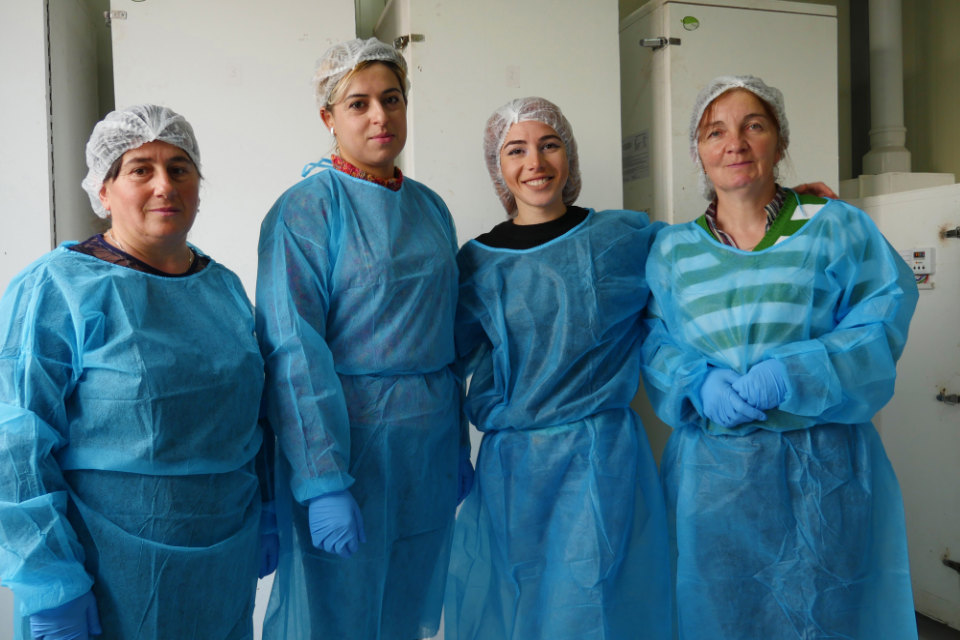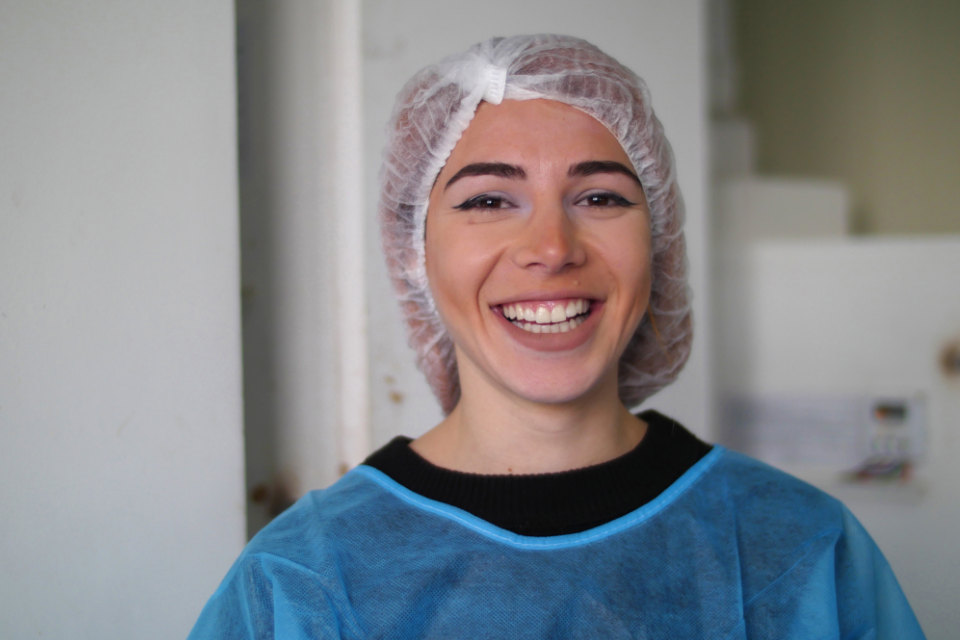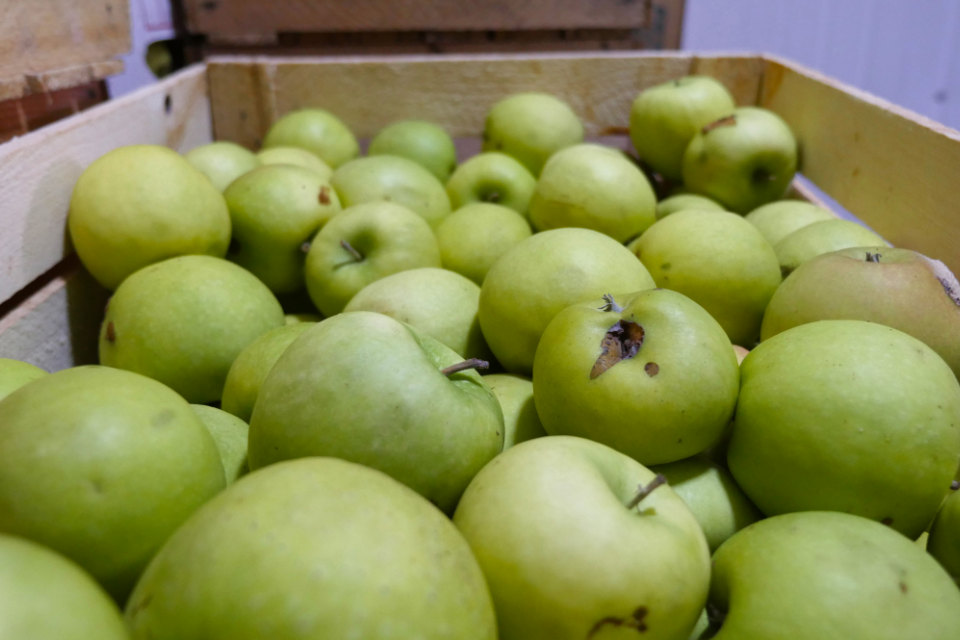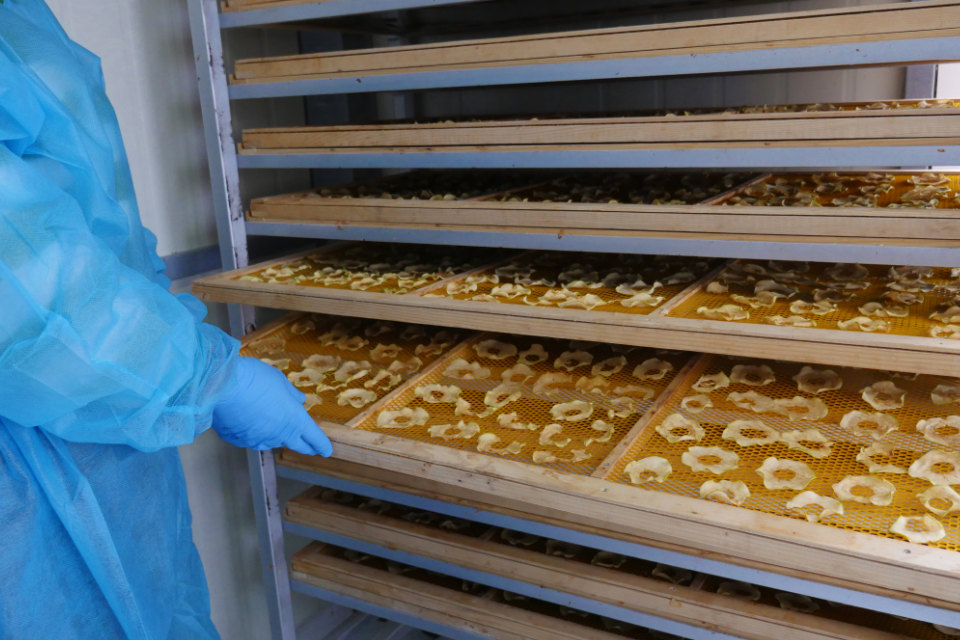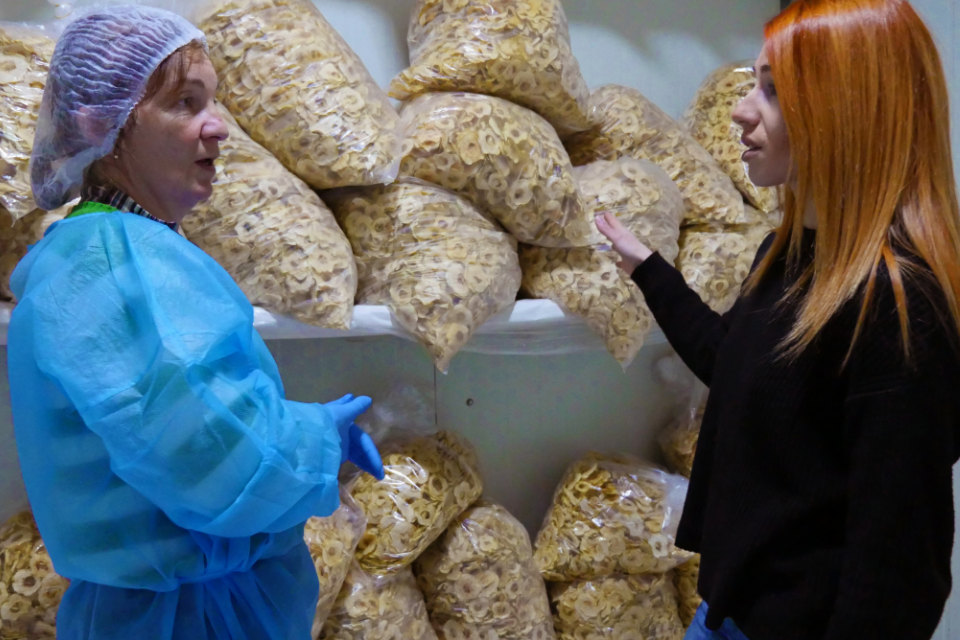Nona Noniashvili: A young entrepreneur in Georgia who is planting seeds to help a conflict-affected community grow
Date:

Nona Noniashvili is a 25-year-old Georgian entrepreneur who decided to build her company’s factory in a conflict-affected village along the boundary with South Ossetia, to help a community in need and empower local women. She managed to keep her business afloat during the COVID-19 pandemic by using online sales and social media promotions. She urges women entrepreneurs not to lose hope and continue to create to overcome the challenges caused by the pandemic.
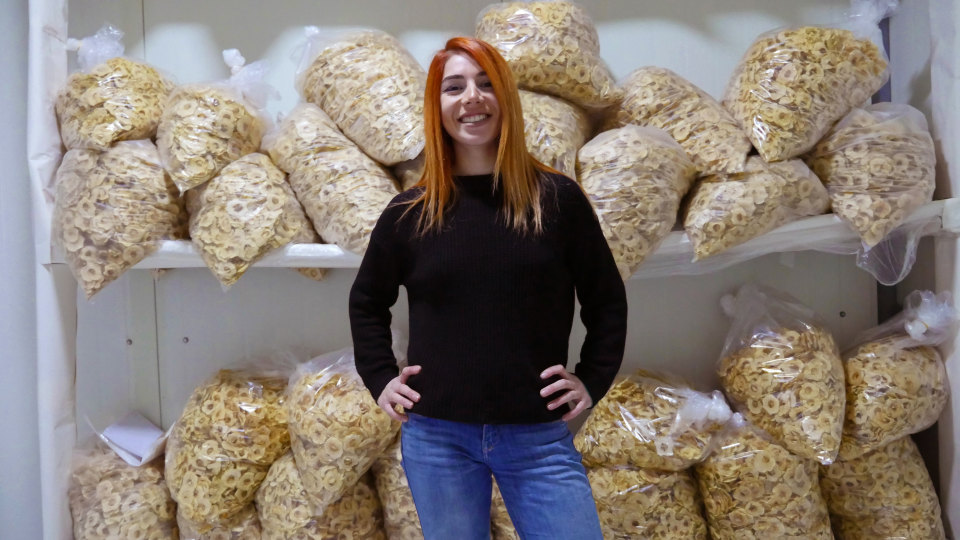
Nona Noniashvili said her “lightbulb” moment happened in a laboratory at her university.
The inspiration hit when her and her two fellow classmates and future business partners, Tamari Sheitnishvili and Shalva Mdzinarashvili, attended a lecture on the technology of drying fruit at the Agricultural University of Georgia, where they were studying food technology and business administration.
Excited by the innovation, and seeing dried fruit as a perfect product to make in a country famous for its apples, they decided to try their hand at building their own fruit dryer and starting a company that produced apple chips. They believed that Georgians were lacking healthy snack options, so they wanted to create something beneficial for their customers yet unique in the market.
And with that, the Enkeni Apple Chip Company was born, currently being sold in stores all throughout Georgia.
But their choice on where to produce the chips is what really makes Enkeni unique – in conflict-affected Ditsi Village, located on a contested boundary line between Georgia and the breakaway region of South Ossetia.
“One of my business partners is from Ditsi Village, and we decided that this was the right place for us,” says Nona. “Setting up here was a really important part of building our company and continues to be crucial to our business goals – to partake in our share of social responsibility to help this region grow amidst the conflict.”
An award-winning beginning
Three young entrepreneurs with an inventive idea and a plan to empower a community in need was bound to get people’s attention, and from the beginning, Enkeni’s business plan garnered a lot of support.
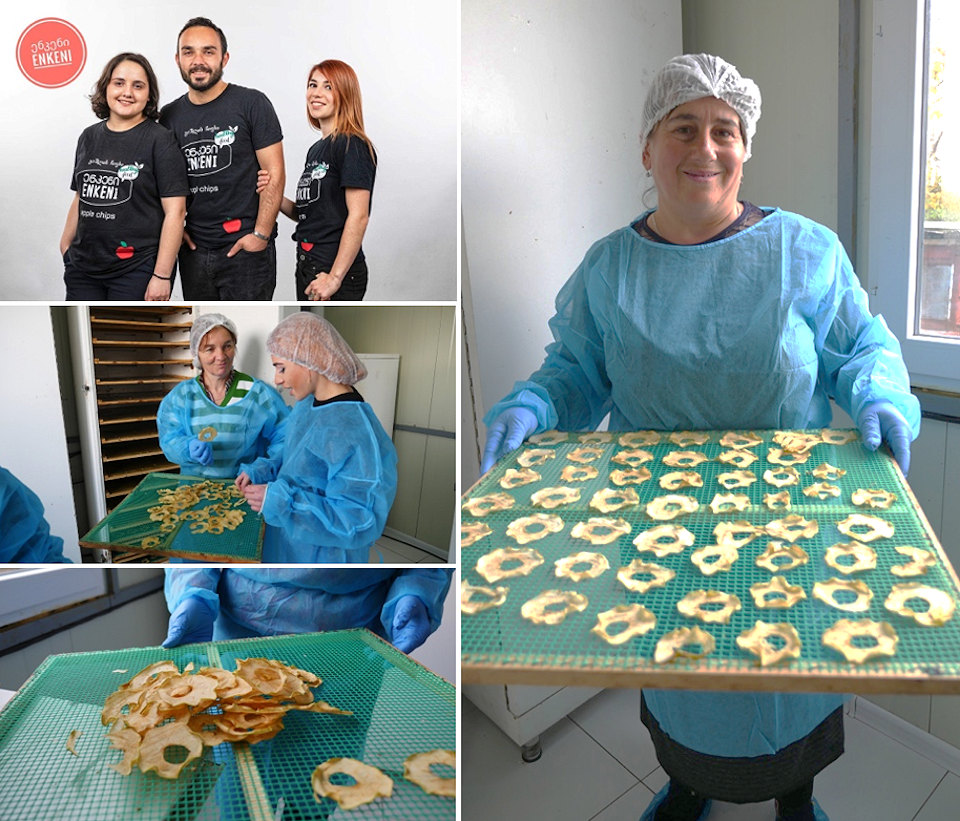
“We participated in a lot of business competitions – winning valuable start-up money for Enkeni,” says Nona. “We went to Estonia, where we ended up winning first prize in a student business competition.” When they were awarded substantial seed money in the Startup Georgia competition, their dreams for Enkeni were finally able to become a reality. With that money, they built their small factory in Ditsi Village.
Since 2018, Enkeni has also been involved in a UN Women-funded project with the Georgian Farmers’ Association called “A Joint Action for Women’s Economic Empowerment” – that aims to support young women entrepreneurs and start-ups in Georgia. “We were really happy to be awarded funding from this project, which helped us to buy equipment that was essential for us to really get our production going,” Nona shares. “Enkeni has two women co-founders, so what we were doing was interesting to UN Women. They saw the potential for us to scale-up and become a global brand.”
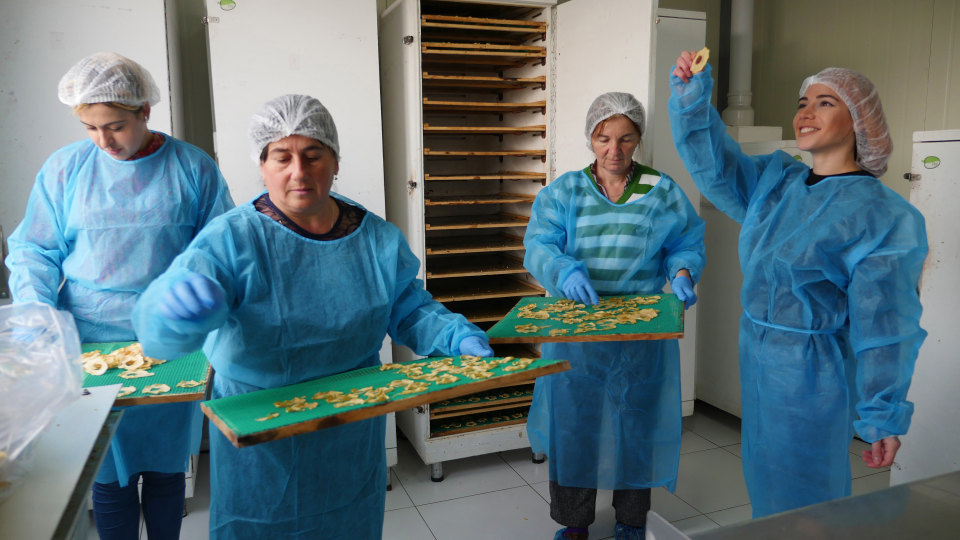
The pandemic did not stop us
Nona says they were only mildly impacted by the COVID-19 pandemic, as food production was allowed to continue. Enkeni was able to keep selling their product in markets and through an online platform (Soplidan.ge) that UN Women connected them with. Amid the pandemic, the team worked on marketing their healthy snacks and developed a free delivery service – all of which has boosted their chips’ popularity.
“Our sales actually grew, even during the pandemic,” says Nona, proudly.
She urges governments to be more supportive of businesses during the pandemic, especially small and medium-sized enterprises. “It would have been so much better if governments supported businesses with equipment and other needs and provided tools for them to quickly adapt to online services,” says Nona.
A partnership with a community in conflict
The pandemic was not the only challenge Nona and her partners faced during their entrepreneurship journey.
Ditsi Village is a world apart from the buzzing metropolis of Tbilisi, a 100 kilometre journey that Nona travels 2-3 times a week. Upon leaving Tbilisi, the cityscape quickly turns bucolic and the life more slow-paced, but when arriving at Ditsi village the atmosphere changes abruptly.
In order to enter the village and get to the factory, you have to cross multiple checkpoints guarded by armed police. The environment is tense, and the community of only 1,072 people lives under constant strain from a conflict that has been going on since the 2008 military clashes between Russia and Georgia. So-called “Borderization” issues are part of daily life for all Ditsi citizens, since the boundary line between Tbilisi-controlled territory and the breakaway region of South Ossetia runs through the village.
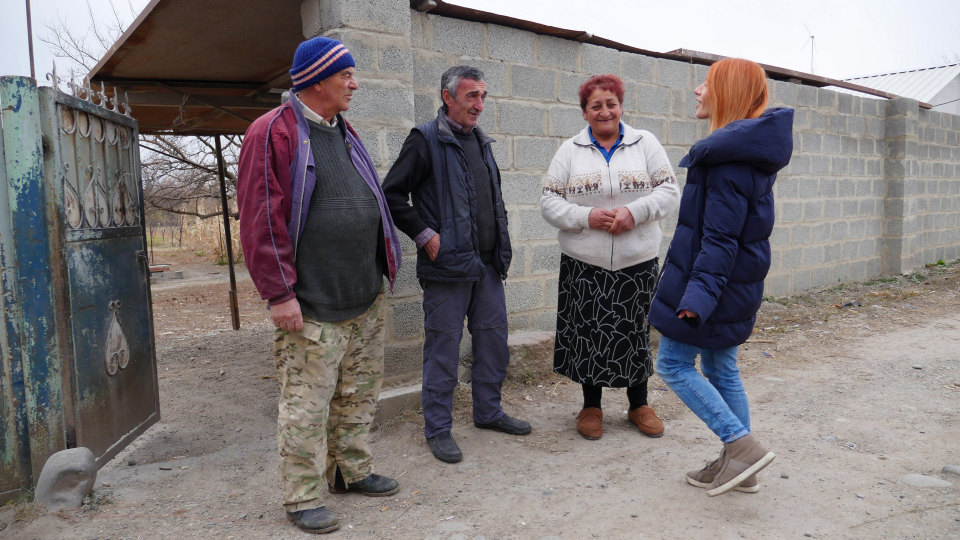
“The employment rate in Ditsi is really low because generally the population has no options for work except their own small agricultural activities,” Nona explains. “We are the first functioning factory in Ditsi that employs local staff, so the locals were really happy and excited that we decided to come here.”
It took the Enkeni factory six months just to get electricity because of their location in a conflict-affected region, so it was extremely difficult to build anything. “Enkeni was created in 2016, but our production was delayed for 1.5 years because of the challenges in setting up in Ditsi Village,” Nona relates. “But once things got up and running, it was a great accomplishment for all of us.”
Women leading in Georgia
Nona has a vision to help the citizens of Ditsi Village thrive amidst conflict, but she is particularly passionate about empowering the women of the community. The factory is currently staffing six local women, and they are trying to grow that number. “I love being at the factory,” Nona says, “I love all the women who are involved with Enkeni and the fact that we are creating this product together. It’s really like one big family.”
I love all the women who are involved with Enkeni and the fact that we are creating this product together."
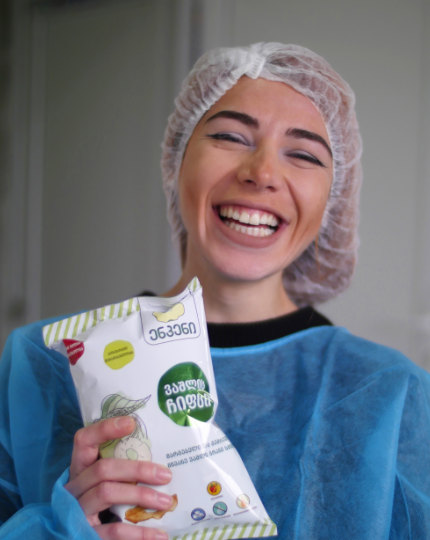
It’s important to Nona to have as many women as possible involved in Enkeni, and she takes that idea even further in her belief that it’s crucial for more women in Georgia to have their own businesses and to strive to become heads of industry. “There’s still a big imbalance here between men and women who are involved in business or have leading roles in management,” she explains. “But there’s a growing trend now, especially in Tbilisi, for women to be involved in business or to create their own start-ups. This is a great thing, and I’m really happy to be a part of it.”
 There’s a growing trend now for women to be involved in business or to create their own start-ups. This is a great thing, and I’m really happy to be a part of it.”
There’s a growing trend now for women to be involved in business or to create their own start-ups. This is a great thing, and I’m really happy to be a part of it.”
— Nona Noniashvili
“When I was starting out I was only in my early twenties and I had illusions. I had what I thought was a great idea and assumed that things would go really well, really quickly.” But Nona now knows that starting a business can be very difficult and slow-moving, especially for start-ups. She still encourages all women to go for it, but advises “you should love what you are doing so much that you are able to put everything into it.”
Growing together into the future
Nona’s dream for her business is to have it grow into a global brand, and UN Women is helping this dream by supporting the rebranding of Enkeni as well as exploring export opportunities. “It’s a big goal, but I believe it’s possible for us. It would be a great achievement to see Enkeni in as many countries as possible.”
She also has dreams for Ditsi Village – to expand the Enkeni factory, employ more local people and help their staff to build themselves personally and economically. “In the future we plan on having trainings and other educational projects so our staff can develop in different ways,” she says. “We don’t just want them to be ordinary employees, we want to help them grow as well.”
And with Enkeni and the community of Ditsi Village helping each other grow, their harvests are bound to be plentiful.
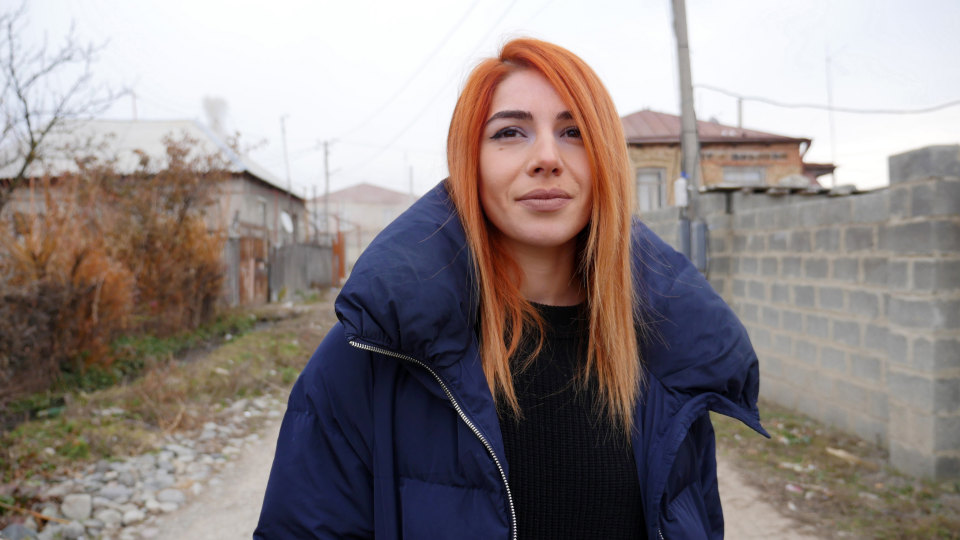
Let’s reimagine our world. Equality everywhere. How? Generation Equality has the answers! For the 25th anniversary of the Beijing Declaration and Platform for Action, we asked 25 women to probe still hidden issues and share inspiring ideas on getting transformation going, for good.
